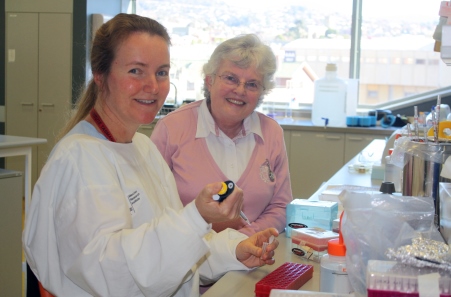New study looking to help lupus sufferers

New study looking to help lupus sufferers
Menzies Research Institute Tasmania, an institute of the University of Tasmania, has received $35,000 in funding from the Lupus Association of Tasmania to commence a new participant-based study on lupus.
Menzies Research Institute Tasmania, an institute of the University of Tasmania, has received $35,000 in funding from the Lupus Association of Tasmania to commence a new participant-based study on lupus.
Lupus is a disease of the immune system, which affects more than 17,000 Australians.*
Lupus is most common in women (90 per cent) and the majority develop the condition in childbearing years, between the ages of 15 and 44.*
Lupus or Systemic lupus erythematosus (SLE) is a chronic inflammatory autoimmune disease in which the immune system mounts a spontaneous inflammatory response and damages healthy tissues and causes pain.
In most people only the skin and joints are affected. However, in other people SLE can also affect the kidneys, blood, lung, hearts, blood vessels and brain.
Because lupus can affect so many different organs, a wide range of symptoms can occur. Common symptoms include painful or swollen joints, butterfly-shaped rash on the cheeks and nose, extreme fatigue, fever, anaemia, and abnormal blood clotting.
Menzies' Research Fellow Professor Heinrich Korner who is heading up the new project says that the different clinical signs of the disease especially in the early stages make a diagnosis difficult.
"It often takes months or even years before a correct diagnosis is made. This can lead to lengthy delays in treatment," Professor Korner said.
"Our study will analyse blood samples from lupus patients and healthy volunteers to identify the presence of marker molecules that are showing high activity of white blood cells which are responsible for the symptoms of SLE.
"It is hoped that identifying these marker molecules will lead to earlier diagnosis and better treatment for patients," he said.
"While lupus cannot be prevented or healed, once diagnosed it can often be treated effectively with medication," he said.
Menzies is looking for a further 50 volunteers medically diagnosed with lupus and 25 healthy volunteers to take part in this study.
Anyone interested should contact Professor Heinrich Korner on 03 6226 4698.
Testing will take place in Launceston and Hobart.
* The Australasian Society of Clinical Immunology and Allergy (ASCIA) 2010.
Contact:
Phone:
Email: